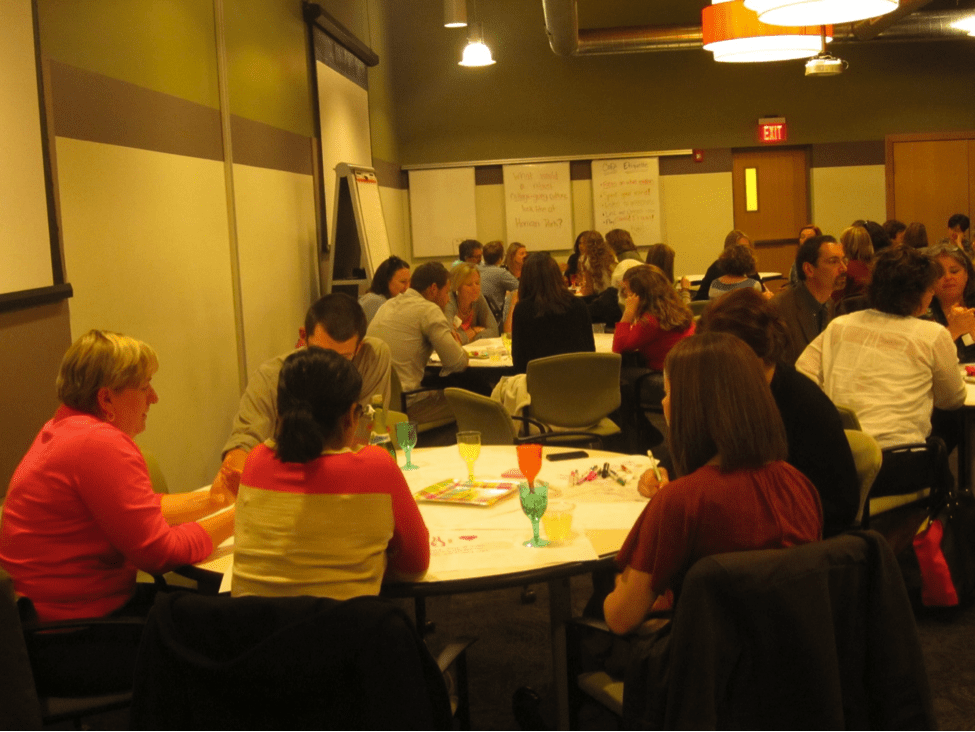This post is a part of our systems thinking tools blog series where we’re introducing and sharing guidance for using different tools to support systems thinking and practice.
It was the end of a long day. Teachers and administrators from Harrison Park K-8 School in Grand Rapids, Michigan converged at the Grand Rapids Community Foundation for a celebration of Challenge Scholars, an initiative to increase educational attainment among low-income students. School staff spoke enthusiastically with each other as they picked up some refreshments and found a seat at 1 of the 10 round tables in the room. The energy in the room was palpable to those of us facilitating the 2-hour meeting. “People seem excited to be here,” I thought, breathing a sigh of relief while I finished hanging the last set of flip charts with a guiding question for the World Café activity.
Preparation is the key to any successful large group meeting. The room looked festive and inviting thanks to the event coordinators at the Foundation. One goal for this meeting was to celebrate the teachers and administrators who had been working so hard to successfully launch and implement Challenge Scholars in its first year. Our second goal was to gather information to inform FSG’s ongoing Developmental Evaluation of Challenge Scholars, and specifically to understand better what a college and career culture looks like at Harrison Park School.
One of the 6 guiding questions for the evaluation was: How is a college and career culture emerging within the schools and broader West Side community?
A key component of the broader Challenge Scholars system is the local schools. We designed this meeting to take a closer look at the school system, in order to understand what “college and career culture” means to school employees. We decided to use World Café, which is a method of engaging participants in several rounds of small-group conversation to intentionally connect multiple ideas and perspectives on a topic. We selected this process because we wanted to:
- Explore the topic of “college and career culture” from multiple perspectives in the school “system.”
- Ensure that everyone in the room regardless of role or tenure would contribute.
- Generate conversation that would lead to a more collective vision of “college and career culture” across functions within the school.
- Provide an opportunity for different actors within the system to learn from and relate better with each other.
In groups of 6, school employees were asked to discuss, write, and doodle responses to the World Café question: What would a robust college-going culture at Harrison Park school look like? People deliberated and drew enthusiastically at their tables. After 25 minutes, table groups dispersed (with the exception of 1 table host) and joined a new table group. This provided an opportunity for people to share and build on their ideas.
After the small group exercises, table hosts were asked to report out key themes from the 2 rounds of conversations. One theme that emerged was students having skills around “perseverance” and “resilience,” as well as the right “mindset” and “work ethic” to succeed. As a result, our evaluation incorporated measures of “soft skills,” such as grit, into our data collection.
In addition to being a useful technique for collecting data from a wide range of perspectives in a relatively short period of time, the World Café also set a positive and collaborative tone for FSG’s engagement with school staff as part of the Challenge Scholars evaluation.
Download the “Guide to the World Café Method” >
 Harrison Park School Staff discuss what a college-going culture looks like as part of the World Café conversations for the Grand Rapids Challenge Scholars evaluation.
Harrison Park School Staff discuss what a college-going culture looks like as part of the World Café conversations for the Grand Rapids Challenge Scholars evaluation.
In addition to the World Café tool, you may find the following resources helpful:
- The World Café: Shaping Our Futures Through Conversations That Matter. (2005) Juanita Brown, David Isaacs, and the World Café Community.
- Building Corporations as Communities: Merging the Best of Two Worlds. (1994) Juanita Brown and David Isaacs. From The Fifth Discipline Fieldbook, Peter Senge, et al.
- World café hosting toolkit. Curated by The World Café, this link contains an online suite of resources for those interested in conducting a world café exercise.
